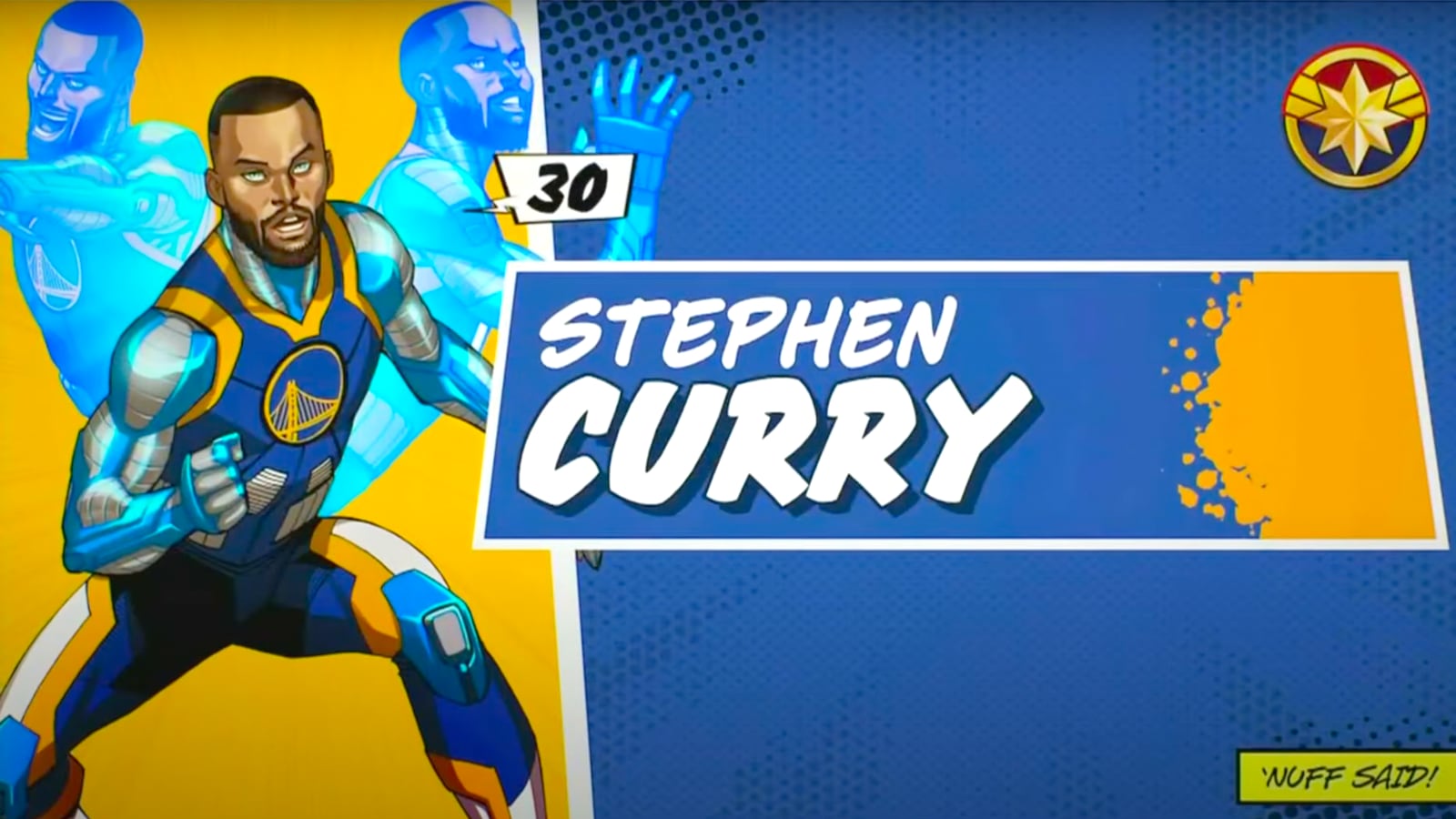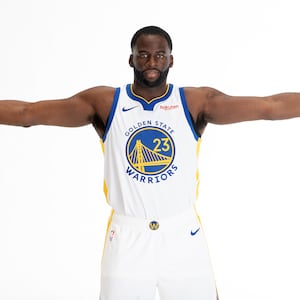We live in the age of the impossibly big corporation. Mammoth entities with a complex web of departments allotting hundreds of wildly divergent tasks, all designed to catch as many profit flies as possible. Take media, for instance, where, under the command of CEO Bob Iger, the Walt Disney Company has claimed all the intellectual property their tendrils can touch, packaging it together in a content hydra that dominates the box office and swings a giant axe in the streaming wars. Marvel, Pixar, The Muppets, Star Wars: if a broad audience has any fondness for it, Disney will buy it—and they’ll wring as much marketable content out of it as possible.
And so, on Monday night, in pursuit of the glory of pure corporate synergy, Disney’s popular sports network, ESPN, hosted a Marvel superhero-themed broadcast of the Golden State Warriors and New Orleans Pelicans game on ESPN2. It was called “The Arena of Heroes.” It is an unprecedented event in the history of sport/comic book-superhero crossovers, I guess. It was a singular product of corporate monoculture, and, according to this person who writes about sports business for The Athletic from time to time, a brilliant gambit hatched from the mind of Bob Iger, the world’s great visionary “genius.”
It’s true. Only Bob Iger could have made this happen, and not only because no one else would have been interested in making it happen in the first place. Look, you own properties, you gotta smush them together and see if any magic comes out. That’s just business 101, baby. Why else would you even hire a cadre of antitrust lawyers if not for the opportunity to air themed broadcasts of late-season NBA games between two teams struggling to make the playoffs?
Anyway, I like NBA basketball and I like Marvel stuff—check out Saladin Ahmed’s limited-run Black Bolt series for a wild time—so I flipped it on to see what mega-genius Bob Iger’s vision for the future of media was like. (Also, someone was paying me to write about it.)
Here’s what I can tell you: It was pretty fucking weird!
First things first: There was a plot imposed on the game. I will try to explain it as best I can but there is pretty much no way you’re going to reach the end of this paragraph and understand what is going on. The Avengers, who are, in the reality of this broadcast, real (but not so real that they couldn’t interview Anthony Mackie, the actor who plays Sam Wilson, the new airborne Captain America, mid-game), need a new person to train and fight intergalactic crime with them. They have decided that the best way to choose this person is to watch the Pelicans/Warriors game on May 3, and distribute hero points to a small selection of players in the game, nominated for the honor by six different superheroes. Captain Marvel picked generational sharpshooter Steph Curry; Dr. Strange aligned himself with thinking-man’s tough Draymond Green; Black Panther chose Andrew Wiggins (Wakandans apparently have better shit to do than watch the NBA); Iron Man opted for Lonzo Ball (they share daddy issues); Black Widow went for Brandon Ingram; and Captain America, who, once again, is living a parallel existence as a real guy and a guy who second-quarter interviewee Anthony Mackie is playing in television shows and movies, went for Zion Williamson, who is a nightmare on legs.
The winner of this game, presided over by cruel, indifferent superhero gods, would be determined by who netted the most “Hero Points.” Here is how they calculated Hero Points: One point for every point, rebound, and assist you manage; minus one point for every turnover and missed shot; and 10 extra points to you if your team wins the game. Honestly, as far as elegant single-number NBA metrics go, Hero Points is not the worst one you could come up with. For a large chunk of the game, for instance, Lonzo Ball had negative Hero Points, which really tracked considering how poorly he was playing.
The broadcast was intensely metafictional while also being performed at a distance. Ryan Ruocco and ex-New Jersey Net Richard Jefferson were on the call in the traditional broadcaster/former player sense, but they were also joined by Angélique Roché, the host of a Marvel podcast and a superhero PR-type. Her capacity for NBA knowledge seemed pretty slim, but whatever, she was there to give the broadcast a Marvel touch.
The three of them spent the entire time referring to the heroes like they were real, but with an oddly sarcastic veneer, like, yes, I am acting like Doctor Strange really did pick Draymond Green in this basketball game, but also I swear to God I’m a serious person. Ruocco fired off a lot of Marvel movie quotes, which was kind of impressive: he really got a lot in there. At one point Richard Jefferson put on an Iron Man helmet and said, “This is the coolest thing I’ve ever done,” in a way that implied that he did actually remember that he has dunked a basketball in an NBA game, and that he was deeply weirded out that he was one of the only guys on staff who’d actually watched these movies before. (ESPN really dropped the ball by not giving basketball misanthrope and Alonzo Mourning leg resident Jeff Van Gundy this assignment: I think he would have broken with reality altogether somewhere around the third quarter.)
There were also graphics. Oh boy, were there graphics. Occasionally you would see these Dreamcast-looking CGI renderings of characters “watching the game,” standing courtside, or sitting on the jumbotron. The booth would talk about them like they were real people. Pretty unnerving. Whenever one of the assigned players scored, there was a big ol’ logo that popped up over the rim. Draymond scores and boom, the Doctor Strange logo’s imposed on the screen. When someone dunked, there was either a Hulk Smash graphic that materialized on the rim or a big ol’ bolt of Thor Thunder. These graphics were not particularly well-programmed, and occasionally went off when a player was kind of near the rim. Three-point shots were given trails, like the glowing puck experiment they tried on ‘90s NHL broadcasts. The whole ordeal had the feeling of the glowing puck, but extended into infinity and given narrative heft.
Eventually, this exercise in mass dissociation began to give me a headache—one I am still nursing even as I write this. It was all too confusing for an NBA game or a cheap Marvel marketing ploy. Who was this for, even? Did kids like this? They didn’t sense the overwhelming series of disconnects, the feeling that the entire enterprise was invalidating itself? Do children understand the feeling of a postmodernist prison, or is it just me, an adult saddled with the existential crises that accompany the passing of time?
I did, in spite of myself, end up invested in who won the Hero Points battle. I love Draymond Green’s game and rooted for him to win this weird-ass contest, and guess what? In the last minute they were on the court before New Orleans was compelled to wave the white flag, Green passed Steph Curry by a single Hero Point and my sports-rooting interests were fulfilled. Post-game, he suggested he was somehow aware of this Hero Point battle. There is absolutely no way this is true, but, hey, fun lie, I guess.
It was a noisy, weird happening that no audience could have possibly enjoyed. In conclusion, check out Loki, coming in June, only on Disney+.


